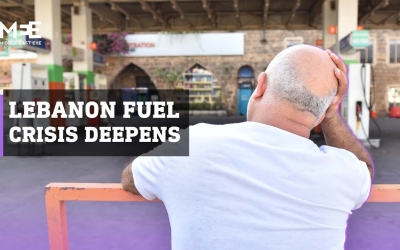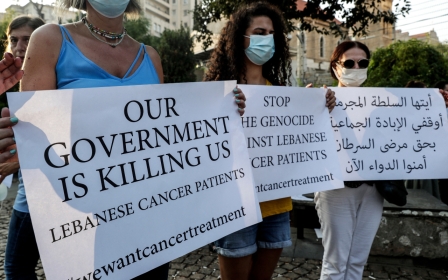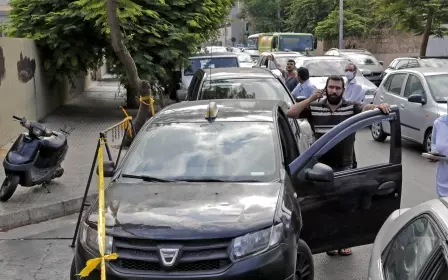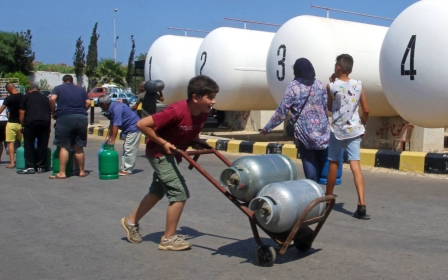Lebanon's fuel crisis is causing a drinking water crisis
As a severe fuel crisis continues to wreak havoc across different sectors in Lebanon, drinking water is becoming ever scarcer, with companies cutting production, pushing people towards dangerous coping mechanisms.
With its plentiful rivers, springs and lakes, Lebanon is one of the most water-rich countries in the region. Despite this, without bottled water, most of the population would have no water to drink.
The Mediterranean nation's reliance on the bottled product is such that, in the years prior to the economic crisis currently ravaging the country, this was a growing business, with companies producing up to 800 million litres of bottled water annually.
Now, in addition to the impact the shortage of fuel is having on production and distribution companies, residents are also contending with a financial crisis that has led to a steep increase in prices across the board.
The price of bottled water in Lebanon has skyrocketed in less than two years. A one-litre water bottle once cost 1,000 Lebanese pounds - just under a dollar - but today, prices have increased fivefold.
'If there is no fuel, then there won’t be any water. Nobody will be able to drink'
- Ghassan Geagea, sales manager at Tannourine
With the local currency losing 90 percent of its value, the new prices are only cheaper for the small segment of society that has US dollars to spare. For most of the population, still earning in the local currency, drinking water has become a heavy burden on their budget.
The country’s health ministry lists over three dozen certified bottled water companies on its website, with Tannourine among one of the largest on the list. The price of a 12-pack of 500ml bottles at major supermarkets has quadrupled. Tannourine's sales manager Ghassan Geagea says it and other large bottled water companies have struggled to operate with the worsening currency and fuel crisis.
“It’s the fuel crisis, really,” Geagea told MEE. “Some companies are buying fuel from the black market, or others, like us, are directly buying at $580 per tonne.”
Petrol and diesel prices mean that bottled water companies can’t operate their trucks and bottling plants.
Lebanon’s Ministry of Industry recently allowed businesspeople to directly import fuel, rather than go through a licensed distributor, to ease the shortage. Even though paying in hard foreign currency is a major financial blow, subsidised imported fuel has gone missing in the black market or is being hoarded by suppliers to sell at a higher profit later.
Geagea says Tannourine isn’t making any profits and is operating at a loss.
“Look, just don’t ask [about our losses],” he said with a tense laugh. “I don’t even check with management anymore.”
'Domestic water'
State water infrastructure is poor. Tap water is not clean enough for consumption, and doesn’t even reach all households.
“We call it domestic water, not potable water,” Elie Mansour, a UN habitat senior planning and infrastructure engineer, told MEE. “Households that don’t get state water rely on private water trucks - but they cost a fortune now.”
Lebanon’s water authorities are cash-strapped and poorly managed, struggling to repair cracked and rusty pipelines and treat water supply adequately. The chlorine treatment and filters are all imported, virtually impossible when state contracts are in the near worthless Lebanese lira.
As a result, Mansour says water can get contaminated on its way to households, and much of it leaks through the cracked pipes on the way. It’s simply undrinkable.
“I don’t know anyone who drinks water straight out of the tap,” Mansour said. “Either they buy filters for cooking or resort to bottled water.”
The United Nations says almost three-quarters of the population live in poverty, and just as many could lose access to water. With inflation crippling the country, buying water or filters has become a significant financial burden for a large chunk of Lebanese people.
'Dangerous coping mechanism'
Mansour is concerned about some of the dangerous coping mechanisms vulnerable communities have resorted to in the face of this water crisis.
'Some families have been boiling water before drinking it, or in some cases simply drink it straight from the tap. This can lead to waterborne diseases'
- Elie Mansour, UN infrastructure engineer
“Some families have been boiling water before drinking it, or in some cases simply drink it straight from the tap,” he explained. “This can lead to waterborne diseases, and we have documented cases of salmonella and diarrhoea.”
The UN engineer says there are many viable solutions, but it requires infrastructure investment and formulating proper policy to finance it by restructuring water bills. “The water source can be the cleanest in the world, but once it runs through those pipelines it becomes contaminated,” Mansour said.
Until Lebanon can restore its battered economy and fix its decaying water infrastructure, families will have almost no choice but to pay for drinking water. As political paralysis and policy inaction persists, the chances of a public health crisis grow.
Geagea and other representatives from bottled water companies say they have reached out to the government to figure out a solution, but say they were turned away.
“Do you think they care? They don’t answer - or they just tell us, ‘What can we do?’” Geagea said. “If there is no fuel, then there won’t be any water. Nobody will be able to drink.”
This article is available in French on Middle East Eye French edition.
Middle East Eye propose une couverture et une analyse indépendantes et incomparables du Moyen-Orient, de l’Afrique du Nord et d’autres régions du monde. Pour en savoir plus sur la reprise de ce contenu et les frais qui s’appliquent, veuillez remplir ce formulaire [en anglais]. Pour en savoir plus sur MEE, cliquez ici [en anglais].





